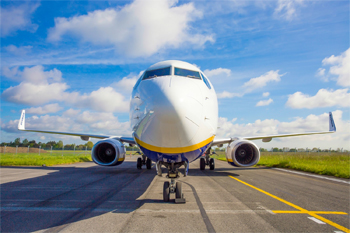Transport secretary Grant Shapps has hinted that ministers will be sympathetic to pleas for financial help that could run into billions of pounds from sections of the aviation industry at risk from the coronavirus pandamic.
With many airlines already hit by a drop in demand, the extension of a ban on entering the US to people (other than US residents and citizens) travelling from the UK and Ireland is expected to have a major impact on airlines.
Updated: Virgin Atlantic said on Monday it will reduce its schedule, 'prioritising core routes based on customer demand', with a reduction of approximately 80% of flights per day by 26 March and about 75% of its fleet parked. At points in April this will go up to 85%.
Staff will be asked to take eight weeks unpaid leave over the next three months, with the cost spread over six months' salary, 'to drastically reduce costs without job losses'.
Europe’s biggest airline, Ryanair, said a full grounding of its fleet ‘cannot be ruled out’.
It was reported that the chairman of Virgin Group, which owns Virgin Atlantic, was to write to ministers to call for up to £7.5bn of emergency support to the UK aviation industry.
Tim Alderslade, chief executive of Airlines UK, the industry body representing UK-registered airlines, said: 'The current challenges faced by the UK airline sector are truly unprecedented, and stark. Even just days ago, the idea that airlines across the globe would be cancelling thousands of flights and grounding aircraft on the current scale would have been unthinkable.
'Yet, this is the situation we see today, with carriers managing both the devastating impact of the collapse in demand for flying as people stay home, alongside the daily operational challenges of responding to border closures, travel restrictions and new health protocols.
'The situation is now truly critical. COVID-19 risks a lasting and irreversible effect on the health of the UK’s aviation industry – the third largest in the world – and the future for UK airlines is indeed now uncertain.'
Speaking on BBC Breakfast, Mr Shapps said: ‘Obviously it’s a big concern that airlines are right at the forefront of this crisis, because of course travel was the very first thing internationally which was hit. I’m meeting with the airlines, the airports, in fact the whole of the transport sector right across the board this week.
‘And I’m taking that information and playing it into the economic and business committee that the chancellor will be chairing from today. Our view is, whether you’re a business or indeed an individual in this country, with COVID-19 good businesses shouldn’t be put out of business and people should be able to continue after we get through this crisis and that is what we’ll be aiming to achieve.’
The calls for financial help received backing from the Unite union, which represents tens of thousands of workers throughout the aviation industry. Unite said it was ‘calling on the Government to listen to UK airlines and provide immediate support for the whole sector, in order to help it survive the coronavirus pandemic’.
Assistant general secretary Diana Holland said: ‘The Government must act decisively and act now, so that when the coronavirus crisis ends there will still be a UK aviation industry.
‘Up and down the UK Unite is working with airlines, airports and the supply chain, to preserve jobs and companies for the future and it is essential that the Government plays its part.
‘The challenges faced by the UK aviation industry at this moment are entirely unprecedented and all solutions to support the sector must be fully considered.’
International Airlines Group (IAG), which owns British Airways, does not appear to be seeking cash support but chief executive Willie Walsh has agreed to delay his retirement.
IAG said available seat kilometres in the first quarter of 2020 are now expected to be reduced by around 7.5% compared to last year. For April and May, it plans to reduce capacity by at least 75% compared to the same period in 2019.
However, it said that it has ‘strong liquidity’ of €9.3bn.

Ryanair issued a picture of one of its jets on the tarmac
Ryanair said on Monday morning that for April and May it now expects to reduce its seat capacity by up to 80%, ‘and a full grounding of the fleet cannot be ruled out’.
It added that it is taking immediate action to reduce operating expenses, and improve cash flows.
In a statement, the low-cost carrier said: ‘The Ryanair Group has strong liquidity, with strong cash and cash equivalents of over €4bn as at 12 March. Our focus now is on completing as much of the scheduled flying program as is permitted by National Governments over the next 7 days, so that we can repatriate customers, where possible, even as flight bans are imposed and [air traffic control} and essential airport services are reduced.’
CEO Michael O’Leary said: ‘Ryanair is a resilient airline group, with a very strong balance sheet, and substantial cash liquidity, and we can, and will, with appropriate and timely action, survive through a prolonged period of reduced or even zero flight schedules, so that we are adequately prepared for the return to normality, which will come about sooner rather than later as EU Governments take unprecedented action to restrict the spread of Covid-19.’
Register now for full access
Register just once to get unrestricted, real-time coverage of the issues and challenges facing UK transport and highways engineers.
Full website content includes the latest news, exclusive commentary from leading industry figures and detailed topical analysis of the highways, transportation, environment and place-shaping sectors.
Use the link below to register your details for full, free access.
Already a registered? Login